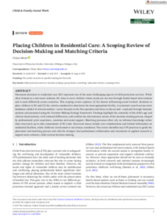Placement decisions in residential care (RC) represent one of the most challenging aspects of child protection services. While often framed as a last-resort solution, RC aims to serve children whose needs are not met through family-based interventions and is used differently across countries. This scoping review explores: (I) the factors influencing social workers' decisions to place children in RC and (II) the criteria considered to determine the most appropriate facility. A systematic search across seven databases yielded 10 relevant studies—seven focused on the first question and three on the second—analysed through thematic analysis and presented using the Decision-Making Ecology framework. Findings highlight the centrality of the child's age and clinical characteristics, with national differences, and confirm the discretionary nature of the decision-making process, shaped by professionals' prior experience, emotions and social support. Matching processes often rely on informal knowledge rather than structured, up-to-date assessments of RC units. Recurrent issues include cost considerations and limited information on residential facilities, while children's involvement is not always considered. The review identifies key CPS practices to guide the placement and matching process and calls for stronger inter-professional collaboration and investment in applied research to support more coherent, child-centred decision-making.

